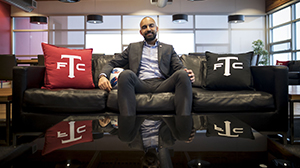UofGH sets new record with 54 placements at case competitions in 2017-2018

Third-year Business student Daniel Bielak poses on UofGH campus in Toronto.
University of Guelph-Humber students have set a new record in case competition victories, soaring past their previous high mark with an unprecedented 54 total Top 3 finishes for external case competitions over the 2017-18 academic year.
That lofty number includes a best-ever 19 first-place finishes for UofGH students in case competitions, which pit participants against one another to develop the best solution to a business-related case study. The University’s previous record was 30 Top 3 finishes, a mark that was set a year prior.
Top performing current students this past year included Cristina Morrone, Conor Kelly, Emma Lal, Dilshan Jayasinghe, Pankush Jhamat and Jhanvi Jarminder.
“I am inspired by the hard work and determination many of our students portray on a daily basis, spending significant time preparing for each external competition,” said Justin Medak, Assistant Program Head of Business, who volunteers hours of his time to train the competitors.
“The growth in Guelph-Humber’s case competition program has extended provincially, nationally and internationally over the past five years.”
Thriving under pressure
Daniel Bielak knew he wanted to participate in case competitions from the very first moment he stepped foot on UofGH campus in Toronto for Program Preview Day and heard Medak explain the concept. In fact, UofGH’s case competition success was a big part of why he decided to study here.
Now entering his third year, Bielak found participating in case competitions just as invigorating as he expected.
He was part of the University of Guelph-Humber’s team at the recent Royal Roads Design Thinking Challenge, where students were tasked with devising creative solutions for problems currently facing the city of Victoria. Their presentations were reviewed by city staff – including Victoria mayor Lisa Helps – as well as design thinking experts and other stakeholders. Another highlight was the LIVE Competition at the University of Toronto Scarborough, where he had the chance to present his ideas to real executives from Nestle.
Typically, competitors are only given a short period of time to come up with their proposals, which means they have to think quickly on their feet.
“It’s exhilarating,” said Bielak, who placed in three competitions this past year. “I like solving problems. I like approaching challenges.”
Other benefits
Participating in case competitions is hard work, and students spend significant time on campus running through practice scenarios and refining their approaches.
However, that work pays off in a multitude of different ways.
“The case competition program extends a student’s learning outside the classroom,” Medak said. “These competitions allow a student to take the theories learned in a classroom environment and apply them to real-life problems faced by business leaders on a daily basis.
“In addition, students who compete in these external competitions develop stronger presentation and analytical skills, which translates to higher grades within the classroom,” he added.
“Employers are taking notice of students who compete in external case competitions. In November 2016, a team of four UofGH students competed and won the Dalhousie Ethics in Action Case Competition. A year after graduation, two students were employed by Deloitte, one at Accenture and the final student is attending law school.”
Certainly, Bielak has already noticed that his work in case competitions and his studies at UofGH have intertwined to his great benefit.
“During the LIVE competition, I remembered all my economics information from first year – I didn’t even know I still had it all in my mind,” he said with a laugh.
“It makes me a better student. Because it’s gratifying to know that the work you put into class helps you perform better in a competition. It makes you want to work harder.”








